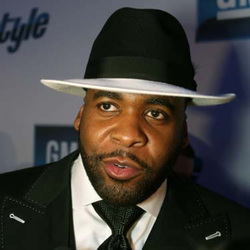
A jury has reached a verdict in the public corruption case of former Detroit Mayor Kwame Kilpatrick, his father, and close friend. Kilpatrick was found guilty on 40 out of 45 counts.
Kilpatrick was accused of running a criminal enterprise through the mayor's office to enrich himself through bid rigging and extortion, and using nonprofit funds for personal gain.
Kilpatrick, his father Bernard Kilpatrick and his contractor friend Bobby Ferguson faced a combined 45 charges accusing them of racketeering, extortion, bribery and mail fraud, among other things. Kwame Kilpatrick faced 30 counts, Ferguson faced 11 and Bernard Kilpatrick, Kilpatrick’s father, faced four.
Kilpatrick was accused of running a criminal enterprise through the mayor's office to enrich himself through bid rigging and extortion, and using nonprofit funds for personal gain.
Kilpatrick, his father Bernard Kilpatrick and his contractor friend Bobby Ferguson faced a combined 45 charges accusing them of racketeering, extortion, bribery and mail fraud, among other things. Kwame Kilpatrick faced 30 counts, Ferguson faced 11 and Bernard Kilpatrick, Kilpatrick’s father, faced four.
The most weighty of the charges was the one levied under the Racketeer Influenced and Corrupt Organization Act (RICO), a 1970 law that was initially designed to combat organized crime but has since been used in several public corruption trials. In the Detroit case, prosecutors charged the group they called the “Kilpatrick Enterprise” engaged in a pattern of criminal activity – one of the requirements of RICO -- that included at least two criminal acts.
The defendants were accused of, among other things, shaking down contractors and rigging bids to help steer lucrative contracts to Ferguson. Prosecutors said the philosophy of the enterprise was simple: If you wanted work in the city of Detroit, you either had to hire Ferguson, or in some cases, hire the mayor’s father as a consultant.
The jury also heard about Kilpatrick’s lavish lifestyle and his non-profit Kilpatrick Civic Fund, which the government said the ex-mayor used as a personal piggy bank. Prosecutors said the fund was meant for voter education and youth, but Kilpatrick used it for everything from yoga lessons and vacation getaways to college tuition for his relatives and spy equipment.
Several businessmen also testified that they lavished Kilpatrick with vacations, custom-made suits and jewelry because they wanted to keep him happy, and they needed help with city deals.
All three men vigorously denied the charges, saying they never demanded anything of anyone and were committed to helping minority businesses grow.
The most serious charges, including racketeering and mail fraud, carry maximum 20-year prison sentences. Other crimes in the indictment, such as bribery and extortion, each carry a maximum 10-year prison sentence. The Kilpatricks also faced tax charges, which carry three-year maximum prison sentences.
When the trial started last fall, it included a fourth defendant — ex-city water director Victor Mercado. But he pleaded guilty during trial to conspiracy and awaits sentencing.
The defendants were accused of, among other things, shaking down contractors and rigging bids to help steer lucrative contracts to Ferguson. Prosecutors said the philosophy of the enterprise was simple: If you wanted work in the city of Detroit, you either had to hire Ferguson, or in some cases, hire the mayor’s father as a consultant.
The jury also heard about Kilpatrick’s lavish lifestyle and his non-profit Kilpatrick Civic Fund, which the government said the ex-mayor used as a personal piggy bank. Prosecutors said the fund was meant for voter education and youth, but Kilpatrick used it for everything from yoga lessons and vacation getaways to college tuition for his relatives and spy equipment.
Several businessmen also testified that they lavished Kilpatrick with vacations, custom-made suits and jewelry because they wanted to keep him happy, and they needed help with city deals.
All three men vigorously denied the charges, saying they never demanded anything of anyone and were committed to helping minority businesses grow.
The most serious charges, including racketeering and mail fraud, carry maximum 20-year prison sentences. Other crimes in the indictment, such as bribery and extortion, each carry a maximum 10-year prison sentence. The Kilpatricks also faced tax charges, which carry three-year maximum prison sentences.
When the trial started last fall, it included a fourth defendant — ex-city water director Victor Mercado. But he pleaded guilty during trial to conspiracy and awaits sentencing.
 RSS Feed
RSS Feed